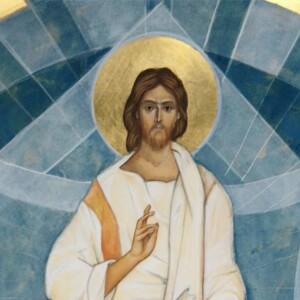
The Firmament and the Waters Above - St. John Chrysostom
 2024-08-28
2024-08-28
What is the firmament? What does scripture mean by “waters above the heavens”? St. John expounds upon the Scriptural testimony and raises our minds and hearts both to God’s creation and God Himself. 0:00 Introduction 1:26 Scripture: Genesis 1:6-8 and Psalm 148:4-6 2:33 Commentary on Psalm 148:4 3:00 Commentary on Genesis 1 (Homily 4) 18:16 Commentary on Genesis 1 (Homily 6) 22:00 On the Statues to the People of Antioch (Homily 9) 22:59 On the Statues to the People of Antioch (Homily 12) 25:04 Commentary on Matthew 26:6-7 (Homily 80) 25:22 Commentary on Hebrews 8:1-2 (Homily 14) 26:52 Commentary on Hebrews 9:2 (Homily 15) 27:14 Commentary on Ephesians 5:15-17 (Homily 19) 31:36 Scripture: Psalm 148:4-6 To my knowledge, what follows are all of St. John Chrysostom’s teachings on day two of creation, the firmament and the waters above that are available in English. I did not focus on his commentary on the sun, moon, and stars when placed into the firmament on day four. The golden-mouthed Archbishop poured over the scriptures and his homilies on Scripture continues to stand out as exceedingly faithful to the truth and inspired by the Holy Spirit. Regardless of what modern scientists and astronomers tell us, the Patristic axiom remains immovable: we must follow the Holy Fathers. So much of modern science is saturated with philosophy and pseudo-science. The modern heliocentric model has turned the plain reading of many scriptures on their head. In addition to the many scientific and observational reasons to question the heliocentric dogma so often assumed today, the Holy Scriptures and the Holy Fathers, especially St. John Chrysostom, beckon us to revisit modern assumptions and reconsider the truth about the realm in which we God has placed us to work out our salvation. -READ St. John’s commentary on Genesis 1-17: https://archive.org/details/saint-john-chrysostom-homilies-on-genesis-1-17/page/59/mode/1up -READ St. John’s homilies on Matthew, Ephesians, Hebrews, and more: https://www.newadvent.org/fathers/ -READ St. John’s commentary on Psalm 148: https://www.amazon.com/St-John-Chrysostom-Commentary-Paperback/dp/B010TSV5E2 -READ St. John’s homilies On the Statues to the People of Antioch: https://www.ccel.org/ccel/schaff/npnf109.xix.xi.html#fna_xix.xi-p40.1 -FIND an Orthodox parish and monastery near you: https://orthodoxyinamerica.org/ _______ St. John teaches: ‘The water above the heavens.’ You hear Moses also saying that he left some of the waters below, and caused some to float on the surfaces of the heavens, fixing the firmament in the middle of the abyss, and let the waters remain on the surfaces. -Commentary on Psalm 148:4 And what is more pleasing or more beautiful than the firmament of Heaven. -Homily 80 on the Gospel of Matthew The text goes on: "God made the firmament, and God divided the water which was below the firmament from the water which was above the firmament." That is to say, once the firmament existed, he ordered some of the water to go below the firmament, and some to be on top of the firmament. Now, what would you say this means, the firmament? Water that has congealed, or some air that has been compressed, or some other substance? No sensible person would be rash enough to make a decision on it. Instead, it is better to be quite grateful and ready to accept what is told us and not reach beyond the limits of our own nature by meddling in matters beyond us, but rather to know only the simple fact and keep it within us—namely, that by the Lord's command the firmament was produced, causing division of the waters, keeping some below and being able to carry the rest elevated on top of it. -Homily 4 on Genesis _______ Orthodox Wisdom is dedicated to sharing the writings and lives of the Saints of the Orthodox Church. Glory to Jesus Christ!
More Episodes
 2023-08-14
2023-08-14
 2023-08-10
2023-08-10
Create your
podcast in
minutes
- Full-featured podcast site
- Unlimited storage and bandwidth
- Comprehensive podcast stats
- Distribute to Apple Podcasts, Spotify, and more
- Make money with your podcast
It is Free
- Privacy Policy
- Cookie Policy
- Terms of Use
- Consent Preferences
- Copyright © 2015-2024 Podbean.com





